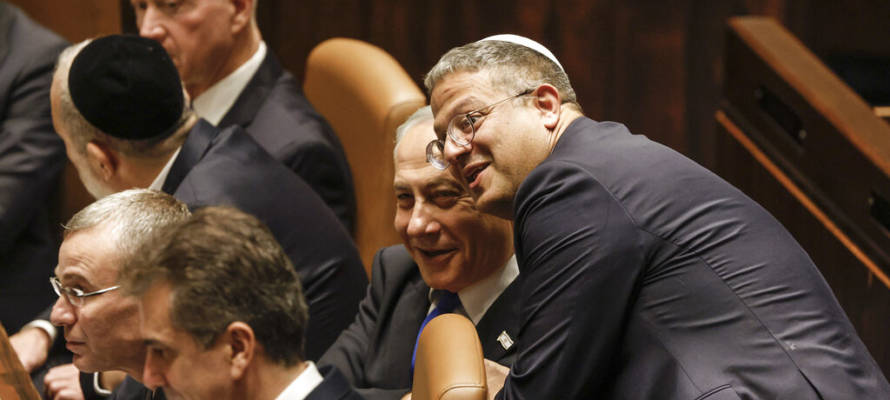“There is reason to estimate that the next government will bring achievements on the economic and social level” for the Arab sector, and we’re prepared to work with Netanyahu,” activists in the Balad party stated.
By Baruch Yedid, TPS
The Arab world responded to Israel’s new government with mixed expressions of confrontation, cooperation and concern.
Abdullah Jenaid, a journalist and former political advisor based in Bahrain told the Tazpit Press Service that “the threat of annexing the West Bank [Judea and Samaria] will terminate any future hope of peace, based on the two state solutions, and the Arab peace initiative.”
According to Jenaid, “any step that would make the Arab initiative irrelevant would be a real challenge to the peace agreements with the Gulf countries, but there are weighty interests between Israel and the Gulf.”
He insisted that “the countries in the Gulf will judge Israel by its actions and not by the composition of its members. There is hope that Netanyahu will be able to steer his government while preventing irreversible steps in the Palestinian cause.”
A senior official in the Palestinian Authority warned TPS, “Israel’s policy, for us, is the annexation of the PA’s territories and the indirect implementation of the ‘Deal of the Century,’ and therefore all options are open.”
The term “all options are open” implies — without openly advocating — violence, withdrawing from peace agreements, the dismantling of the Palestinian Authority, and other scenarios.
“Israel’s announcement contradicts international decisions. These are dangerous statements and will have consequences for the region,” he added.
Arab-Israeli leaders said that they would not rule out cooperation with the new government.
Activists in the Arab Balad party’s institutions stressed, “There is reason to estimate that the next government will bring achievements on the economic and social level” for the Arab sector and we’re prepared to work with Netanyahu.”
On the other hand, Balad chairman and former member of the Knesset Sami Abu Shahada poured cold water on cooperation, saying, “Netanyahu’s extreme government is the result of years of deterioration in Jewish and Israeli society and support for the fascist right, and this is not a marginal minority.”
The more overt political response from outside Israel came from Jordan’s King Abdullah, who warned Israel’s incoming leadership not to change the status on Jerusalem’s Temple Mount.
“If there are people who want a confrontation, we are ready for it,” the king said. “I like to look at the glass half full, but we have red lines and I believe that there are many people in Israel who are as concerned as we are, the exploitation of the holy places in Jerusalem for political purposes will bring things to a loss of control and an intifada that could lead to a complete collapse.”
Abdullah, who is working to strengthen Muslim influence on the Temple Mount, added, “If the new Israeli government changes the status quo and violates the authority of the Waqf, then Jordan is ready for a confrontation.” The king was referring to the Islamic Waqf, a religious trust funded by Jordan which administers the holy site.
‘Relations with Israel no longer taboo’
Meanwhile, Saudi commentators say “relations with Israel are no longer taboo” and Arab reports indicate that the Saudi foreign minister told Jewish figures in the US that “normalization already started years ago.”
However, the Saudi government has not yet responded to Netanyahu’s statement that peace with Saudi Arabia would lead to peace with the Palestinians. Netanyahu made the comments in a Dec. 15 interview with the Dubai-based Al Arabiya TV network.
Official Saudi Arabia is still committed to the Arab peace initiative which was first floated in 2002 as a basis for normalizing relations with Israel. That proposal makes peace with the Palestinians a precondition for the Arab world to normalize relations with Israel.
In the meantime, it seems that if a series of conditions related to Saudi-US relations are met, an Israeli-Saudi breakthrough remains possible.
In Egypt, analysts predict that pragmatism will continue to underscore Jerusalem-Cairo relations.
Hassan Abu Talib, a consultant for strategic studies, believes that all Israeli governments deal with Egypt pragmatically and see it as an important partner in the Palestinian cause.
“Egypt’s relationship with the results of the elections is related to the policy towards the Palestinians and therefore Egypt must expect the collapse of the Palestinian Authority and the two-state solution,” Talib said.
Send 'Warm Winter' Care Packages to Israeli Soldiers - They are Cold!
We are honored to thank the young men and women of the IDF who risk their lives every day to defend the citizens of Israel.
Join us in sending winter care packages and personal notes of support to Israeli soldiers who are out in the cold all day.
Warm up a soldier's heart with essential winter wear including fleece jackets. Keep an entire unit warm by ordering 10 packages... The soldiers truly appreciate your love and concern!



